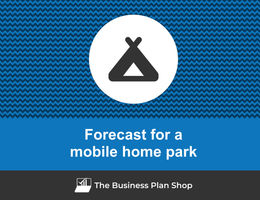How to write a business plan for a mobile home park?
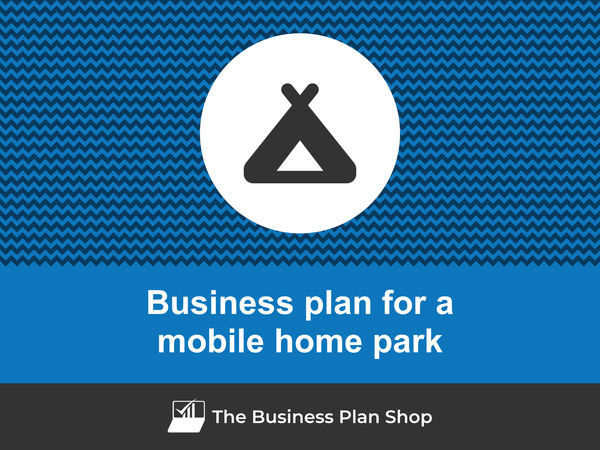
Creating a business plan for a mobile home park is an essential process for any entrepreneur. It serves as a roadmap that outlines the necessary steps to be taken to start or grow the business, the resources required, and the anticipated financial outcomes. It should be crafted with method and confidence.
This guide is designed to provide you with the tools and knowledge necessary for creating a mobile home park business plan, covering why it is so important both when starting up and running an established business, what should be included in your plan, how it should be structured, what tools should be used to save time and avoid errors, and other helpful tips.
We have a lot to cover, so let's get to it!
Why write a business plan for a mobile home park?
Being clear on the scope and goals of the document will make it easier to understand its structure and content. So before diving into the actual content of the plan, let's have a quick look at the main reasons why you would want to write a mobile home park business plan in the first place.
To have a clear roadmap to grow the business
It's rarely business as usual for small businesses. The economy follows cycles where years of growth are followed by recessions, and the business environment is always changing with new technologies, new regulations, new competitors, and new consumer behaviours appearing all the time...
In this context, running a business without a clear roadmap is like driving blindfolded: it's dangerous at best. That's why writing a business plan for a mobile home park is essential to create successful and sustainable businesses.
To write an effective business plan, you will need to take stock of where you are (if you are already in business) and where you want the business to go in the next three to five years.
Once you know where you want your mobile home park to be, you'll have to identify:
- what resources (human, equipment, and capital) are needed to get there,
- at what pace the business needs to progress to get there in time,
- and what risks you'll face along the way.
Going through this process regularly is beneficial, both for startups and existing companies, as it helps make informed decisions about how best to allocate resources to ensure the long-term success of the business.
To maintain visibility on future cash flows
Businesses can go for years without making a profit, but they go bust as soon as they run out of cash. That's why "cash is king", and maintaining visibility on your mobile home park's future cash flows is critical.
How do I do that? That's simple: you need an up-to-date financial forecast.
The good news is that your mobile home park business plan already contains a financial forecast (more on that later in this guide), so all you have to do is to keep it up-to-date.
To do this, you need to regularly compare the actual financial performance of your business to what was planned in your financial forecast, and adjust the forecast based on the current trajectory of your business.
Monitoring your mobile home park's financial health will enable you to identify potential financial problems (such as an unexpected cash shortfall) early and to put in place corrective measures. It will also allow you to detect and capitalize on potential growth opportunities (higher demand from a given segment of customers for example).
To secure financing
Whether you are a startup or an existing business, writing a detailed mobile home park business plan is essential when seeking financing from banks or investors.
This makes sense given what we've just seen: financiers want to ensure you have a clear roadmap and visibility on your future cash flows.
Banks will use the information included in the plan to assess your borrowing capacity (how much debt your business can support) and your ability to repay the loan before deciding whether they will extend credit to your business and on what terms.
Similarly, investors will review your plan carefully to assess if their investment can generate an attractive return on investment.
To do so, they will be looking for evidence that your mobile home park has the potential for healthy growth, profitability, and cash flow generation over time.
Now that you understand why it is important to create a business plan for a mobile home park, let's take a look at what information is needed to create one.
Need a convincing business plan?
The Business Plan Shop makes it easy to create a financial forecast to assess the potential profitability of your projects, and write a business plan that’ll wow investors.

Information needed to create a business plan for a mobile home park
Drafting a mobile home park business plan requires research so that you can project sales, investments and cost accurately in your financial forecast, and convince the reader that there is a viable commercial opportunity to be seized.
Below, we'll focus on three critical pieces of information you should gather before starting to write your plan.
Carrying out market research for a mobile home park
Carrying out market research before writing a business plan for a mobile home park is essential to ensure that the financial projections are accurate and realistic.
Market research helps you gain insight into your target customer base, competitors, pricing strategies and other key factors which can have an impact on the commercial success of your business.
In particular, it is useful in forecasting revenue as it provides valuable data regarding potential customers’ spending habits and preferences.
You may find that people are increasingly looking for mobile home parks that offer modern amenities, such as WiFi or on-site laundry. Additionally, you might discover that there is a growing demand for mobile home parks that provide more communal spaces, like outdoor seating areas or playgrounds.
This information can then be used to create more accurate financial projections which will help investors make informed decisions about investing in your mobile home park.
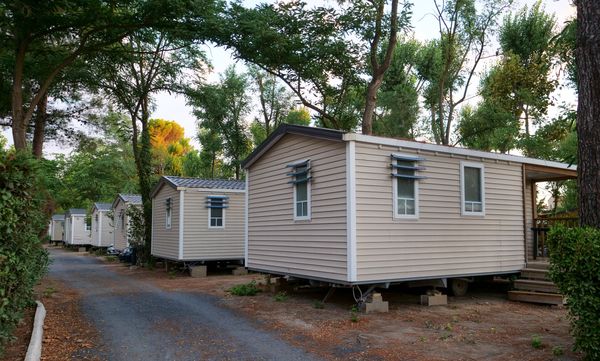
Developing the sales and marketing plan for a mobile home park
Budgeting sales and marketing expenses is essential before creating a mobile home park business plan.
A comprehensive sales and marketing plan should provide an accurate projection of what actions need to be implemented to acquire and retain customers, how many people are needed to carry out these initiatives, and how much needs to be spent on promotions, advertising, and other aspects.
This helps ensure that the right amount of resources is allocated to these activities in order to hit the sales and growth objectives forecasted in your business plan.
The staffing and equipment needs of a mobile home park
Whether you are at the beginning stages of your mobile home park or expanding its horizons, having a clear plan for recruitment and capital expenditures (investment in equipment and real estate) is vital to ensure your business's success.
To achieve this, both the recruitment and investment plans must align coherently with the projected timing and level of growth in your forecast. It is essential to secure appropriate funding for these plans.
Staffing costs for a mobile home park may include wages for a manager, office staff, maintenance staff, and security guards. Equipment costs may include items such as mowers, weed trimmers, shovels, rakes, and other tools that may be necessary to maintain the park. Additionally, the park may need to invest in signage, fencing, and other items to ensure that the park is safe and secure for occupants.
To create a financial forecast that accurately represents your business's outlook, remember to factor in other day-to-day operating expenses.
Now that you have all the necessary information, it's time to dive in and start creating your business plan and developing the financial forecast for your mobile home park.
What goes into your mobile home park's financial forecast?
The objective of the financial forecast of your mobile home park's business plan is to show the growth, profitability, funding requirements, and cash generation potential of your business over the next 3 to 5 years.
The four key outputs of a financial forecast for a mobile home park are:
- The profit and loss (P&L) statement,
- The projected balance sheet,
- The cash flow forecast,
- And the sources and uses table.
Let's look at each of these in a bit more detail.
The projected P&L statement
The projected P&L statement for a mobile home park shows how much revenue and profit your business is expected to make in the future.
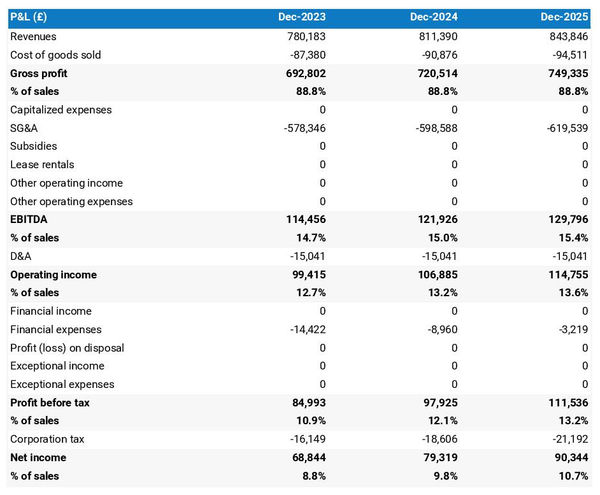
A healthy mobile home park's P&L statement should show:
- Sales growing at (minimum) or above (better) inflation
- Stable (minimum) or expanding (better) profit margins
- A healthy level of net profitability
This will of course depend on the stage of your business: numbers for a startup will look different than for an established mobile home park.
The projected balance sheet of your mobile home park
Your mobile home park's forecasted balance sheet enables the reader of your plan to assess your financial structure, working capital, and investment policy.
It is composed of three types of elements: assets, liabilities and equity:
- Assets: represent what the business owns and uses to produce cash flows. It includes resources such as cash, equipment, and accounts receivable (money owed by clients).
- Liabilities: represent funds advanced to the business by lenders and other creditors. It includes items such as accounts payable (money owed to suppliers), taxes due and loans.
- Equity: is the combination of what has been invested by the business owners and the cumulative profits and losses generated by the business to date (which are called retained earnings). Equity is a proxy for the value of the owner's stake in the business.
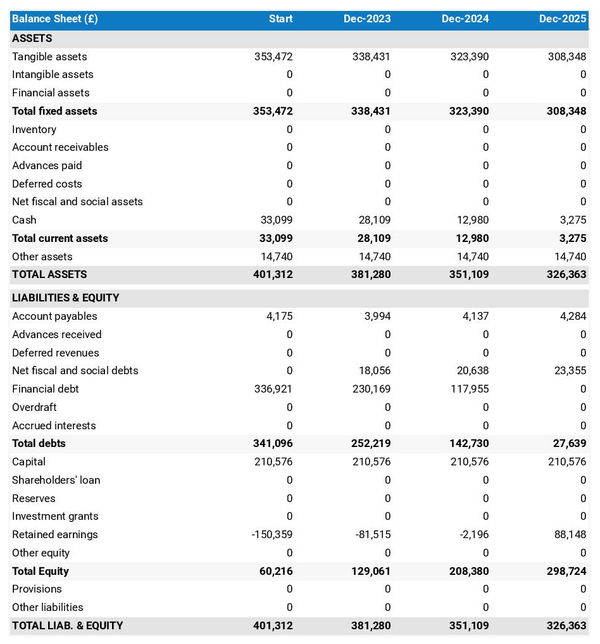
Your mobile home park's balance sheet will usually be analyzed in conjunction with the other financial statements included in your forecast.
Two key points of focus will be:
- Your mobile home park's liquidity: does your business have sufficient cash and short-term assets to pay what it owes over the next 12 months?
- And its solvency: does your business have the capacity to repay its debt over the medium-term?
The cash flow forecast
As we've seen earlier in this guide, monitoring future cash flows is the key to success and the only way of ensuring that your mobile home park has enough cash to operate.
As you can expect showing future cash flows is the main role of the cash flow forecast in your mobile home park business plan.
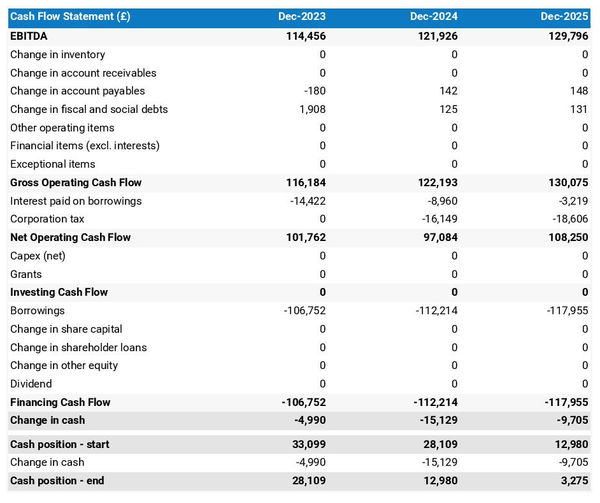
It is best practice to organise the cash flow statement by nature in order to show the cash impact of the following areas:
- Cash flow generated from operations: the operating cash flow shows how much cash is generated or consumed by the business's commercial activities
- Cash flow from investing activities: the investing cash flow shows how much cash is being invested in capital expenditure (equipment, real estate, etc.) either to maintain the business's equipment or to expand its capabilities
- Cash flow from financing activities: the financing cash flow shows how much cash is raised or distributed to financiers
Looking at the cash flow forecast helps you to make sure that your business has enough cash to keep running, and can help you anticipate potential cash shortfalls.
Your mobile home park business plan will normally include both yearly and monthly cash flow forecasts so that the readers can view the impact of seasonality on your business cash position and generation.
The initial financing plan
The sources and uses table or initial financing plan is a key component of your business plan when starting a mobile home park.
It shows where the capital needed to set up the business will come from (sources) and how it will be spent (uses).

This table helps size the investment required to set up the mobile home park, and understand how risks will be distributed between the business owners, and the financiers.
The sources and uses table also highlights what the starting cash position will be. This is key for startups as the business needs to have sufficient funding to sustain operations until the break-even point is reached.
Now that you have a clear understanding of what will go into the financial forecast of your mobile home park business plan, let's have a look at the written part of the plan.
Need a convincing business plan?
The Business Plan Shop makes it easy to create a financial forecast to assess the potential profitability of your projects, and write a business plan that’ll wow investors.

The written part of a mobile home park business plan
The written part of the business plan is where you will explain what your business does and how it operates, what your target market is, whom you compete against, and what strategy you will put in place to seize the commercial opportunity you've identified.
Having this context is key for the reader to form a view on whether or not they believe that your plan is achievable and the numbers in your forecast realistic.
The written part of a mobile home park business plan is composed of 7 main sections:
- The executive summary
- The presentation of the company
- The products and services
- The market analysis
- The strategy
- The operations
- The financial plan
Let's go through the content of each section in more detail!
1. The executive summary
The first section of your mobile home park's business plan is the executive summary which provides, as its name suggests, an enticing summary of your plan which should hook the reader and make them want to know more about your business.
When writing the executive summary, it is important to provide an overview of the business, the market, the key financials, and what you are asking from the reader.
Start with a brief introduction of the business, its name, concept, location, how long it has been in operation, and what makes it unique. Mention any services or products you plan to offer and who you sell to.
Then you should follow with an overview of the addressable market for your mobile home park, current trends, and potential growth opportunities.
You should then include a summary of your key financial figures such as projected revenues, profits, and cash flows.
Finally, you should detail any funding requirements in the ask section.
2. The presentation of the company
The second section in your mobile home park's business plan should focus on the structure and ownership, location, and management team of the company.
The structure and ownership part provides an overview of the legal structure of the business, who the owners are and how much each has invested and owns. If you are seeking financing it is important that the reader gets a clear picture of which legal entity is receiving the funds, and who controls the business.
The location part should give an overview of the premises from which the company is operating, and why that location is of particular interest (catchment area, accessibility, amenities nearby, etc.).
When describing the location of your mobile home park, you may want to focus on the potential for growth in the area. You could mention the presence of nearby amenities such as shops, restaurants, and entertainment venues. You might also want to highlight the potential for increased demand due to the area's proximity to major transportation arteries. Additionally, you could discuss how the area has seen recent growth in population, which could lead to increased demand for mobile home parks. By emphasizing the potential for growth in the area, you could create a compelling argument to convince a third party financier to invest in your park.
Finally, you should introduce the management team. Explain each member's role, background, and experience.
It is also important to emphasize any past successes that the members of the management team have achieved, and how long they've been working together, as this will help potential lenders or investors understand why they should trust in their leadership.
3. The products and services section
The products and services section of your business plan should include a detailed description of what your company offers, who are the target customers, and what distribution channels are part of your go-to-market.
For example, your mobile home park might offer laundry and recreational facilities, such as a pool, tennis court, or basketball court, to its customers. These services would enable customers to stay active and have fun while living in the mobile home park. Additionally, the park might offer a maintenance service to customers, such as lawn mowing, snow shoveling, or trash pickup, to ensure the grounds are kept clean and safe for everyone living in the park. Finally, the park might offer an onsite store to customers, selling items such as groceries, cleaning supplies, and other convenience items. By providing these types of services, customers would have the convenience of having access to many of their needs without having to leave the park.

4. The market analysis
When presenting your market analysis in your mobile home park business plan, you should detail the customers' demographics and segmentation, target market, competition, barriers to entry, and any regulations that may apply.
The goal of this section is to help the reader understand how big and attractive your market is, and demonstrate that you have a solid understanding of the industry.
You should start with the demographics and segmentation subsection, which gives an overview of the addressable market for your mobile home park, the main trends in the marketplace, and introduces the different customer segments and their preferences in terms of purchasing habits and budgets.
The target market section should follow and zoom on the customer segments your mobile home park is targeting, and explain how your products and services meet the specific needs of these customers.
For example, your target market might include retirees who are looking for a more affordable housing option. These retirees may want to downsize from their traditional home, but may not yet be ready for a full-time assisted living facility. They may be looking for a community with plenty of recreational activities and amenities, as well as an affordable cost of living.
Then comes the competition subsection, where you should introduce your main competitors and explain what differentiates you from them.
Finally, you should finish your market analysis by giving an overview of the main regulations applicable to your mobile home park.
5. The strategy section
When crafting the strategy section of your business plan for your mobile home park, it's important to cover several key aspects, including your competitive edge, pricing strategy, sales & marketing plan, milestones, and risks and mitigants.
In the competitive edge subsection, clearly explain what sets your company apart from competitors. This is particularly critical if you're a startup, as you'll be trying to establish your presence in the marketplace among entrenched players.
The pricing strategy subsection should demonstrate how you aim to maintain profitability while offering competitive prices to your customers.
For the sales & marketing plan, outline how you plan to reach and acquire new customers, as well as retain existing ones through loyalty programs or special offers.
In the milestones subsection, detail what your company has achieved thus far and outline your primary objectives for the coming years by including specific dates for expected progress. This ensures everyone involved has clear expectations.
Lastly, in the risks and mitigants subsection, list the main risks that could potentially impact the execution of your plan. Explain the measures you've taken to minimize these risks. This is vital for investors or lenders to feel confident in supporting your venture - try to proactively address any objection they might have.
Your mobile home park could face a number of risks. For example, you may be at risk of damage to the property from natural disasters such as hurricanes, floods, earthquakes, or other extreme weather events. Depending on the location of your park, you might also be vulnerable to theft or vandalism. If your park is in an area with high crime rates, you could be at risk of losing valuable property. It's important to be aware of potential risks and take steps to prevent them.
6. The operations section
In your business plan, it's also essential to provide a detailed overview of the operations of your mobile home park.
Start by covering your team, highlighting key roles and your recruitment plan to support the expected growth. Outline the qualifications and experience required for each role and your intended recruitment methods, whether through job boards, referrals, or headhunters.
Next, clearly state your mobile home park's operating hours, allowing the reader to assess staffing levels adequately. Additionally, mention any plans for varying opening times during peak seasons and how you'll handle customer queries outside normal operating hours.
Then, shift your focus to the key assets and intellectual property (IP) necessary for your business. If you rely on licenses, trademarks, physical structures like equipment or property, or lease agreements, make sure to include them in this section.
Your mobile home park could have a variety of key assets and IP that support its operations. Examples of these may include physical assets such as the land and buildings, as well as intellectual property like proprietary software or customer data. Physical assets could include the mobile home park's roads, fencing, and other infrastructure, as well as the homes and other structures on the property. Intellectual property may include confidential customer data, as well as any proprietary software or applications used to manage the park.
Lastly, include a list of suppliers you plan to work with, detailing their services and main commercial terms, such as price, payment terms, and contract duration. Investors are interested in understanding why you've chosen specific suppliers, which may be due to higher-quality products or established relationships from previous ventures.
7. The presentation of the financial plan
The financial plan section is where we will include the financial forecast we discussed earlier in this guide.
Now that you have a clear idea of what goes into a mobile home park business plan, let's look at some of the tools you can use to create yours efficiently.
What tool should I use to write my mobile home park's business plan?
In this section, we will be reviewing the two main options for writing a mobile home park business plan efficiently:
- Using specialized software,
- Outsourcing the drafting to the business plan writer.
Using an online business plan software for your mobile home park's business plan
Using online business planning software is the most efficient and modern way to create a mobile home park business plan.
There are several advantages to using specialized software:
- You can easily create your financial forecast by letting the software take care of the financial calculations for you without errors
- You are guided through the writing process by detailed instructions and examples for each part of the plan
- You can access a library of dozens of complete business plan samples and templates for inspiration
- You get a professional business plan, formatted and ready to be sent to your bank or investors
- You can easily track your actual financial performance against your financial forecast
- You can create scenarios to stress test your forecast's main assumptions
- You can easily update your forecast as time goes by to maintain visibility on future cash flows
- You have a friendly support team on standby to assist you when you are stuck
If you're interested in using this type of solution, you can try The Business Plan Shop for free by signing up here.
Need a convincing business plan?
The Business Plan Shop makes it easy to create a financial forecast to assess the potential profitability of your projects, and write a business plan that’ll wow investors.

Hiring a business plan writer to write your mobile home park's business plan
Outsourcing your mobile home park business plan to a business plan writer can also be a viable option.
Business plan writers are skilled in creating error-free business plans and accurate financial forecasts. Moreover, hiring a consultant can save you valuable time, allowing you to focus on day-to-day business operations.
However, it's essential to be aware that hiring business plan writers will be expensive, as you're not only paying for their time but also the software they use and their profit margin.
Based on experience, you should budget at least £1.5k ($2.0k) excluding tax for a comprehensive business plan, and more if you require changes after initial discussions with lenders or investors.
Also, exercise caution when seeking investment. Investors prefer their funds to be directed towards business growth rather than spent on consulting fees. Therefore, the amount you spend on business plan writing services and other consulting services should be insignificant compared to the amount raised.
Keep in mind that one drawback is that you usually don't own the business plan itself; you only receive the output, while the actual document is saved in the consultant's business planning software. This can make it challenging to update the document without retaining the consultant's services.
For these reasons, carefully consider outsourcing your mobile home park business plan to a business plan writer, weighing the advantages and disadvantages of seeking outside assistance.
Why not create your mobile home park's business plan using Word or Excel?
Using Microsoft Excel and Word (or their Google, Apple, or open-source equivalents) to write a mobile home park business plan is a terrible idea.
Why?
For starters, creating an accurate and error-free financial forecast on Excel (or any spreadsheet) is very technical and requires both a strong grasp of accounting principles and solid skills in financial modelling.
As a result, it is unlikely anyone will trust your numbers unless - like us at The Business Plan Shop - you hold a degree in finance and accounting and have significant financial modelling experience in your past.
The second reason is that it is inefficient. Building forecasts on spreadsheets was the only option in the 1990s and early 2000s, nowadays technology has advanced and software can do it much faster and much more accurately.
And with the rise of AI, software is also becoming smarter at helping us detect mistakes in our forecasts and helping us analyse the numbers to make better decisions.
Also, using software makes it easy to compare actuals vs. forecasts and maintain our forecasts up to date to maintain visibility on future cash flows - as we discussed earlier in this guide - whereas this is a pain to do with a spreadsheet.
That's for the forecast, but what about the written part of my mobile home park business plan?
This part is less error-prone, but here also software brings tremendous gains in productivity:
- Word processors don't include instructions and examples for each part of your business plan
- Word processors don't update your numbers automatically when they change in your forecast
- Word processors don't handle the formatting for you
- ...
Overall, while Word or Excel may be viable options for creating a mobile home park business plan for some entrepreneurs, it is by far not the best or most efficient solution.
Takeaways
- A business plan has 2 complementary parts: a financial forecast showcasing the expected growth, profits and cash flows of the business; and a written part which provides the context needed to judge if the forecast is realistic and relevant.
- Having an up-to-date business plan is the only way to keep visibility on your mobile home park's future cash flows.
- Using business plan software is the modern way of writing and maintaining business plans.
We hope that this practical guide gave you insights on how to write the business plan for your mobile home park. Do not hesitate to get in touch with our team if you still have questions.
Also on The Business Plan Shop
- In-depth business plan structure
- Difference between business case and business plan
- Business plan vs budget
- How to write the products and services section of your business plan
- Key steps to write a business plan?
- Free business plan template
Know someone who owns or wants to start a mobile home park? Share this article with them!


